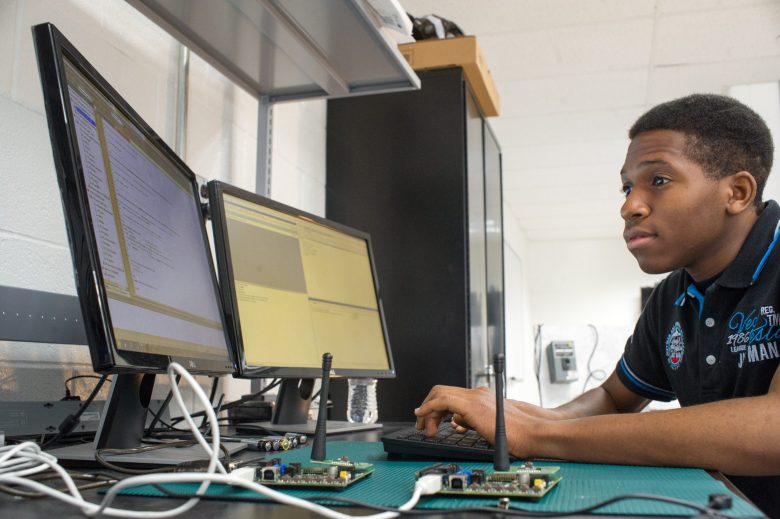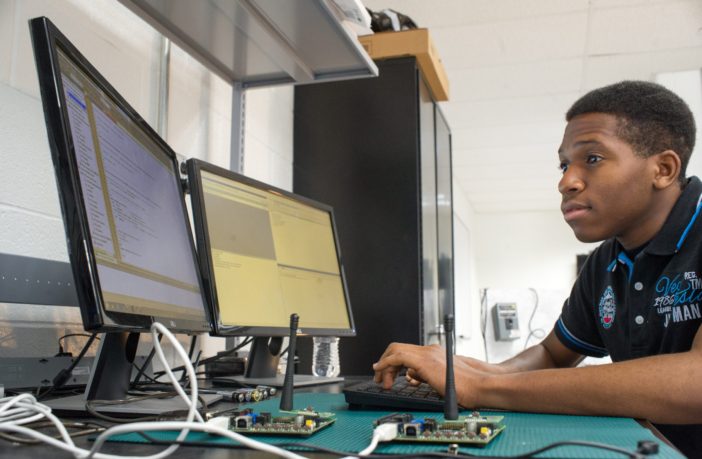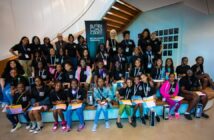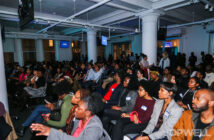 Baltimore’s Morgan State University and Washington D.C.’s Howard University are two of three DMV HBCUs that ranked in the top 10 for producing the most STEM graduates. (Photo courtesy of Morgan State University)
Baltimore’s Morgan State University and Washington D.C.’s Howard University are two of three DMV HBCUs that ranked in the top 10 for producing the most STEM graduates. (Photo courtesy of Morgan State University)
By Megan Sayles
AFRO Business Writer
Report for America Corps Member
msayles@afro.com
The Hundred-Seven is on a mission to positively promote the United States’ historically Black colleges and universities (HBCUs). It features the first and only searchable database of all the academic programs offered by these institutions.
In addition to highlighting the history and impact of HBCUs, The Hundred-Seven has ranked the top 10 HBCU producers of science, technology, engineering and mathematics (STEM) graduates. Three of them are located in the Washington metropolitan (DMV) area: Morgan State University (Morgan State), Norfolk State University (NSU) and Howard University (Howard).
Howard ranked four on the list, the highest among the DMV HBCUs. STEM subjects are among the university’s most favored majors. Biology is the most popular, with Howard being the top institution to send African American undergraduate students to medical school.
“We certainly want to continue to provide an excellent education experience for our students, with access to innovative programs and support of key industry and government partners,” said Anthony Wutoh, provost and chief academic officer at Howard.
One draw to the university is its Karsh STEM Scholars program, which annually enrolls 30 to 35 students who are committed to pursuing STEM Ph.D.s and M.D.-Ph.D.s. Students obtain access to scholarship and wrap-around services to ensure success.
Howard has also expanded on its partnership with Google for its Tech Exchange program, in which computer science students participate in an immersive experience co-taught by Google computer scientists and engineers.
One area of STEM that Howard is strengthening is data science. In 2021, the university created a Center for Applied Data Science and Analytics. Currently, faculty is developing a master’s degree in the subject where students will consider the use of data science to address broader societal issues, including healthcare disparities, criminal justice reform and climate change.
NSU placed seventh on the list. The university has over 1900 students in its College of Science, Engineering and Technology, which has eight departments that include biology, chemistry, computer science, engineering, mathematics, nursing and allied health, physics and technology. It is the largest of the colleges and schools at NSU.
“I think our programs are attractive because of the buildings that we have and also the research that we do and the environment that we give to our students,” said Michael Keeve, dean of the College of Science, Engineering and Technology at NSU. “We work with them and build them up so they can go out and go to grad school to get more degrees and get great jobs as well.”
The nursing and allied health program is the biggest department in the College of Science, Engineering and Technology. Enrolled students learn in state-of-art facilities and progressive simulation labs.
Engineering students have the opportunity to participate in a drone design program, as well as use a creative gaming and simulation lab. NSU is also the first HBCU to be a part of a Netflix boot camp that allows students to gain market-driven skills in Java programming, applied data science and user interface engineering.
The university provides students with access to Centers of Excellence that cover cybersecurity research, cyber defense and nanotechnology education. In the age of highly-advanced cyber attacks, Keeve said cybersecurity is an emerging and critical industry for STEM.
One area of STEM that Keeve said the university would like to expand on is quantum science. He hopes that NSU’s STEM students will become leaders who will advance and innovate technology in their workplaces.
Morgan State ranked nine on The Hundred-Seven’s list. The university is the top producer of African-American engineers in Maryland and one of the top colleges in the nation for graduating Black engineers.
The Clarence M. Mitchell Jr. School of Engineering houses four departments: civil engineering; electrical and computer engineering; industrial and systems engineering; and transportation and urban infrastructure studies. It is the second most-popular discipline on campus.
“Morgan has come from a very humble beginning. To be ranked number nine amongst HBCUs, starting from where we started, I think it’s a very good ranking to have now,” said Oscar Barton Jr., dean of the engineering school. “Of course I want to improve that not only amongst HBCUs but amongst universities in Maryland, as well as nationwide.”
Morgan State’s newest program offers education in mechatronics, which is a synergy between mechanical engineering, computer engineering and computer science. It is the first multidisciplinary undergraduate program at a Maryland public university and the first at an HBCU.
The university continues to offer a PhD program in cybersecurity that is aligned with the National Security Agency (NSA) and serves as a Center of Academic Excellence. This provides students with workforce development opportunities.
This summer, Morgan State received a $1.25 million Apple Innovation Grant to design semiconductor chips, which are responsible for bringing intelligence to smart devices and other technologies.
“Morgan and the Mitchell School of Engineering are uniquely positioned to address workforce development and educational opportunities for an urban community,” said Barton. “Our community is Baltimore City, as one of our major areas from which we find enrollment, and that’s our mission.”
Help us Continue to tell OUR Story and join the AFRO family as a member – subscribers are now members! Join here!



